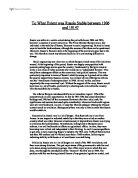The states preserved their own constitutions, rulers and parliaments. Their power in the central government was maintained through the Bundesrat. Prussia was the largest state, it had brought about German unification in 1871 and it was Prussia who dominated thereafter. Germany was governed by the Kaiser, who appointed the Chancellor which from 1871-1890 was Otto von Bismarck. His influence over Kaiser Wilhelm 1st ensured that he had virtually total authority in Germany. Bismarck was head of the army, they played a key role in Germany and many Germans saw the army as a symbol of German superiority and greatness. Despite overruling in Germany, Democracy did exist. The Reichstag was elected every 5 years; they were a powerful influence in how Germany was run. The rise of the Social Democrats was the major political occurrence. Between 1890 to 1912 they gained 70 seats, many of which posed a threat by wanting to demolish the capitalist system, while others strived for social reform. By 1914 Germany had the largest trade union movement in Europe. Even with the presence of pressure groups, others embraced a whole range of ultra-nationalist and expansionist demands. Germany’s economy was expanding at a rate of knots, though their Kaiser, now Kaiser Wilhelm 2nd; the Grandson of Wilhelm 1st, whom was appointed in 1888, was the one to slow down all progress.
Wilhelm 2nd was an unpopular Kaiser during his reign. It was his character, due to popular belief, that was responsible for the 30 years of misfortune Germany endured. Erratic, immature and self assertive were only a few of many words that the population described the Kaiser of being. He took personal interest in almost every subject and his relationships during his reign with many ministers were often accused of being inappropriate; more personal rather than political. On occasion there were sympathetic views of him; intelligent, conscientious and an enthusiastic ruler were words often expressed from supporters of the Kaiser. Regardless of opposition, Historians believe that Wilhelm 2nd played a vital role. To a certain extent this is true, for no major decision could be taken without his agreement. He determined the parameters of what was and what was not possible; he was the head of the empire.
The Kaiser was indomitable; it was this that led to Germany’s political downfall. After the resignation of Bismarck in 1890 there were several successors, none however lived up to the Kaiser’s expectations. After converting his views on the SPD, he now stood as an anti-socialist leader. For many years Wilhelm 2nd was the most decisive figure in the government. He dictated most aspects of policy. Conversely his efforts to take firm anti-socialist action met with little success. Germany’s ruling seemed disorientated with a leader who was more interested in the social scene; whose policies were not driven and who had little public support.
Under Kaiser Wilhelm 2nd reign, politically there was no growth. Even with Germany’s elite industrial stronghold, it was still seen as an authoritarian monarchy. It seemed that the Kaiser was oblivious to his abhorrence; he made no attempt to allow the country to make progress. It therefore fell behind the forever advancing worldwide political state and it wasn’t until 1918 when Germany became a republic that they began to move forward.







